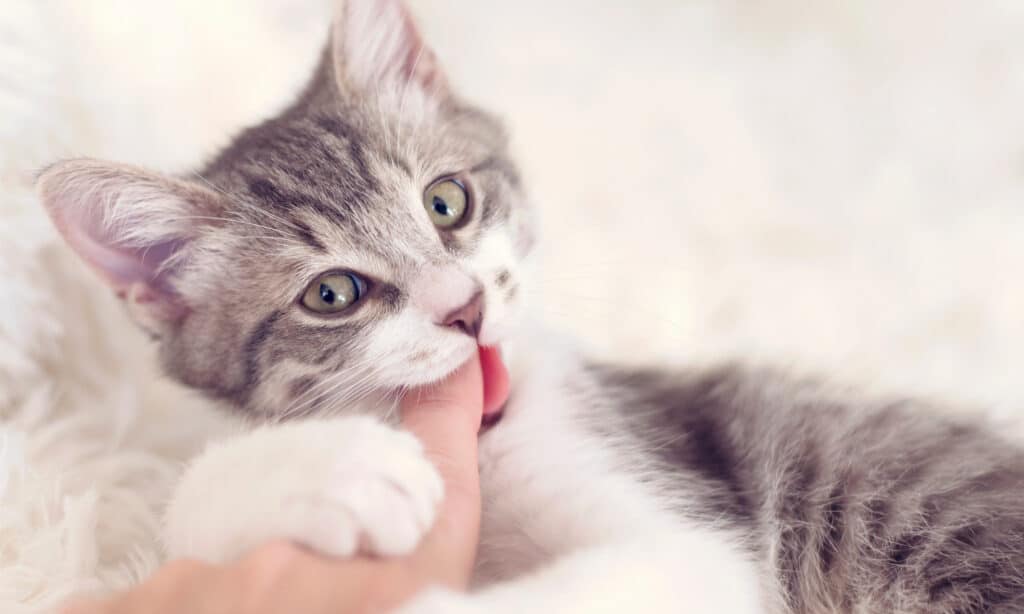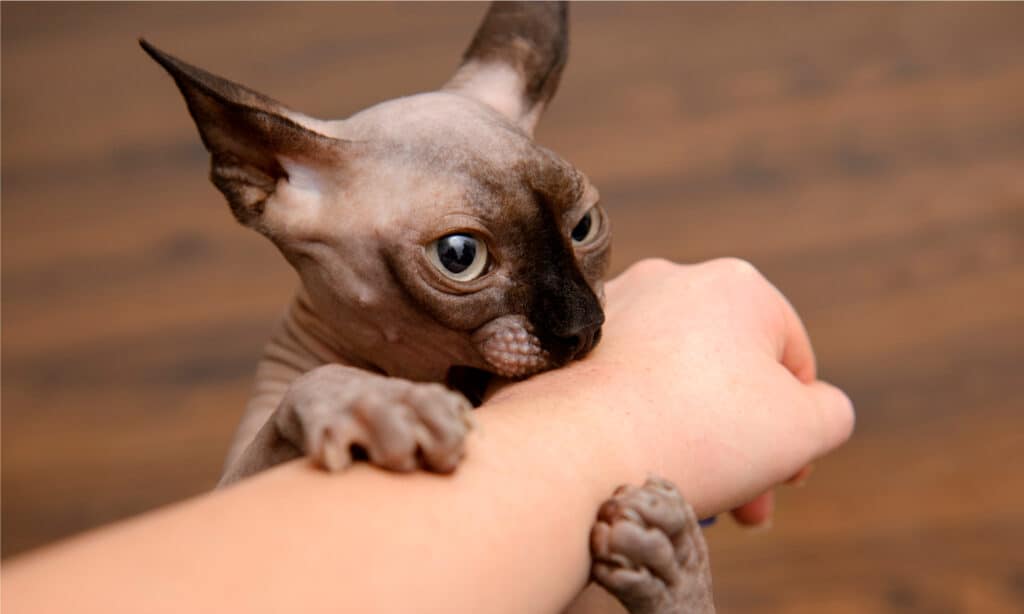Cats are adorable animals. In the context of this write-up, we will be talking about cats kept as a pet for domestic purposes. These little furballs are excellent animals to keep, they provide companionship and a host of other benefits.
However, their social characteristics and abilities don’t overshadow their true nature, in fact, it helps to explain it. Cats are obligate carnivores and thus have quite a powerful bite which can be painful and capable of causing injuries to the receiver. Many cat owners have had to experience a bite once in a while.
You may ask, why does my cat bite? Am I doing something wrong? How can I make it stop? You are not only alone in this predicament. We will answer these questions, and then some.
Reasons Cats Bite
Think of your cats as kids but with a lot of hair and very sharp canines. Kids act out for several reasons, and so do cats. However, you should know that a cat’s bite is a reaction to something, someone in its internal and external environment. We have summarized these various into five main headings. Rest assured the explanation for this erratic behavior may be found among these reasons.
Biting from Development
This scenario is quite common among kittens. It is only natural for your baby cats to use their teeth on anything or the surface around them, which may include your body. Play fighting is a common trait of all cat families, and the fact that your cats exhibit this trait is a good sign. Displaying these traits is quite crucial to the development of your cats. It helps them exercise their instincts and thus forms a part of their mental development.
However, if this behavior is not controlled or curbed, it may become obsessive and quite dangerous. Therefore, as soon as your cats begin to bite humans, you need to discourage the behavior immediately. The behavior must be rejected as quickly as possible. You could provide toys as an alternative. It is almost inevitable for kittens to bite as they grow, but you must stop them from biting humans.

Play fighting, including biting, is a normal part of a kitten’s development.
©Lisa Charbonneau/Shutterstock.com
Biting from Pain and Fear
A cat’s bite is a function of reaction, there may be several causes for this reaction, but the results are the same. Cats may use their bites as a self-defense mechanism when they are scared or under threat. If your cats sense a tense environment where they are uncomfortable, they may react by biting. Also, if they feel that you’re about to endanger them, a serious bite might be coming up.
Cats also bite out of pain, if cats are sick, or you subject them to pain, even if it’s out of love, you may be bitten. Let’s say you have to treat them with an injection, and the pain becomes unbearable, they may bite the caregiver. When they also perceive a threat, they may bite you to keep you alert.
Biting from Agitation
Your lovely furball may turn into an angry biter when it becomes agitated. When you are playing or stroking your pet, they may just have had enough stimulation for one day. Since they can’t speak, they may be showing some behavior, or certain clues to help you know they’ve had enough. Some of these signs might seem normal and not represent any reactions to discomfort.
These signs include sudden head and hand movements, relaxed pinna (ears), movement of the whiskers, and a stiff body. Cats may display one or more of these signs when overstimulated. For them, these are warnings and messages passed to their handlers to stop touching and gently lay them down. When you ignore or don’t understand these signs, your cats will be forced to bite. At this stage, they just want the playing and stimulation to end. It is only normal to pet and play with your animals, however, don’t overdo it. Else, your cats may fight back.
Biting to Communicate
Another reason your cat may bite is to communicate and gain your attention. This type of bite is usually not severe and can be very gentle. Some even call these bites “catnips.” Cats usually bite or scratch their owners gently to remind them of their presence. When cats are ready to play, they will do everything to gain your attention. In most cases, once you give them the attention they need, the biting stops.
It could also mean they need to be fed or to take a walk. Whenever catnips happen, your pet is trying to communicate its needs to you. These needs include; companionship, a change of scenery, food, attention, and in some cases, danger from prey or a perceived threat. Your job is to determine what your cat needs at the time.
The Love Bite
This may sound cheeky, but sometimes cats bite out of affection and love. Once cats can identify you as a friendly face and a trusted companion, they will be free to play and perform all sorts of theatrics with you. It’s a basic cat instinct to use their teeth and nail when playing and gently bite their families.
These bites are much like catnips since they are quite harmless and are less likely to cause any injuries. Love bites from kittens also help them develop affection and a sense of closeness with their family. It is how they display affection.

Although it may seem odd, cats often give their owners love bites.
©ElenaBoronina/Shutterstock.com
How to Stop Cats from Biting
Cat bites can be lethal, especially when you’re bitten in delicate parts of the body. You could also be at risk of contracting an infection. If not checked on time, your pet may become very aggressive and bloodthirsty. They will become and unsafe for you and your family. What are some practical steps you could take to stop cats from biting?
Here are some helpful tips;
- Ensure their biting isn’t being caused by a health issue: As mentioned earlier, cats can be born from internal aggression. Therefore, you may need to consult a veterinary doctor who specializes in cat health. They may be able to effectively explain such erratic behavior and also proffer a solution through medication or therapy. Your cat could be suffering from a health issue that could be unseen from the eyes of a non-professional. By treating the underlying factor, you may be able to stop your cat from going rogue.
- Take time to study your cat’s needs: A careful observation of your cat’s behavior, reactions, and needs might be rewarding. Sometimes to be better equipped to take care of cats, you need to pay close attention to your cat’s needs. You’ll be able to see the behavior it exhibits when it needs something. Look out for body movements, level of aggression, and responses to reflexes. This process doesn’t have to be tedious or boring. You could consider it a part of your daily routine. Studying your cat starts by noting its play patterns, how much food it eats, and what foods it prefers or otherwise.
- Create a safe space for your pet: Sometimes, all that your cat requires is its personal space. Many find it helpful to construct a cat cage within their homes. A simple metal barricade will do. This space serves as a place of seclusion for your cat. It will be a safe environment free from the stress of people carrying your cat about. You could set a clear warning to disallow people from going into this area. It could also serve as a sleeping place for your cat(s) – a pen.
- Read helpful materials: there are many resources online and offline that can help you deal with your cat’s behavior. There are expert books, online forums that talk about cat’s health, and complete guides to successfully raising cats. Most of these materials are available for free, and some you have to buy. You would need all the help you can get while raising cats, especially if you’ve got an aggressive one. You would find helpful tips from other cat owners and healthcare professionals
In the extreme case where all these tips don’t work and your cat’s condition doesn’t improve, you may have to make a hard decision. An aggressive and bloodthirsty cat is dangerous to your home and loved ones. While this may be unlikely, it will be the safest option, all things considered.
Final Note
Cats are lovely animals and can be wonderful pets. While they don’t have dogs’ barks, they can be quite scary. Cats are powerful biters and are not afraid to show that power when they need to. We’ve gone through some of the various reasons for this and some helpful tips to stop it.
If your cats bite, don’t immediately show annoyance. Please do your best to understand what caused it and work to ensure it is properly addressed. This may mean taking it to a veterinarian. Your cats are a part of your family. Treat them with kindness and the appropriate amount of affection.
The photo featured at the top of this post is © iStock.com/zsv3207
Thank you for reading! Have some feedback for us? Contact the AZ Animals editorial team.






